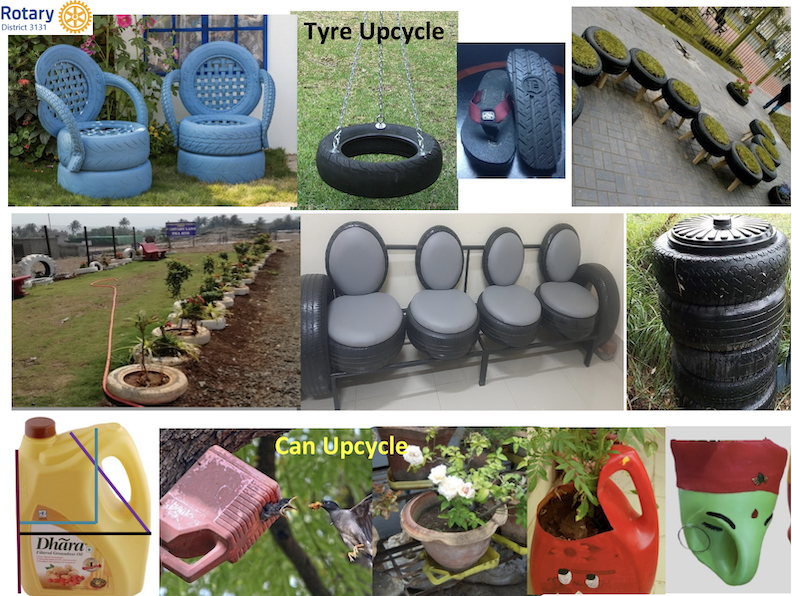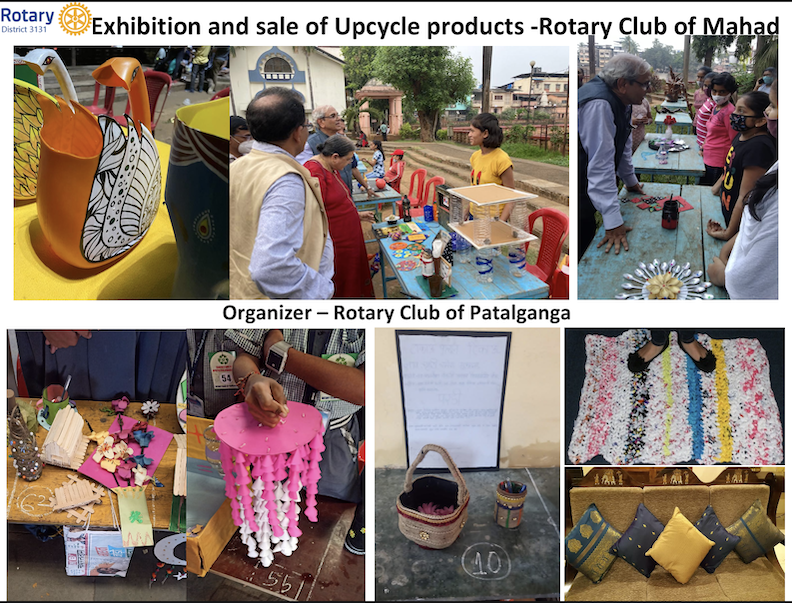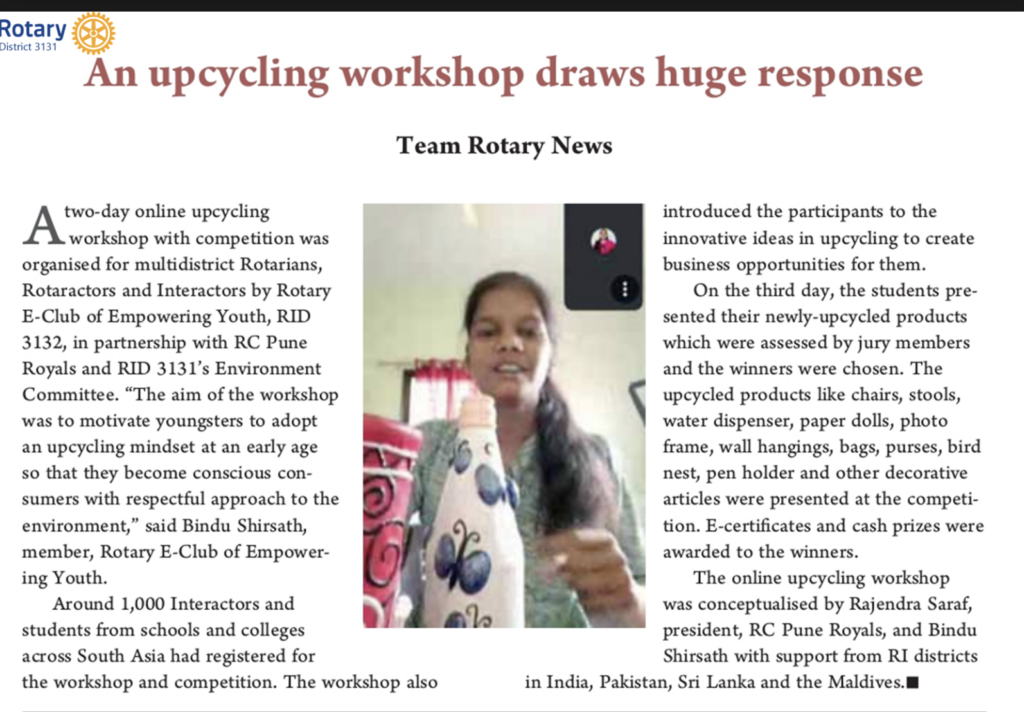by Rtn Rajendrakumar V Saraf, Rotary Cadre of Advisors for the Environment
Teaching Upcycling: Elevating Waste to Wealth and Sustainability
Upcycling increases the original object’s value by transforming by-products, waste materials, worn-out, or unwanted products into new materials or products, often of high quality. Upcycling creates commercial and environmental value. Its biggest benefit is to the planet because it minimizes the consumption of natural resources for making goods and prevents the original products from going to landfill. Upcycling also supports a circular economy by reusing materials multiple times rather than discarding them after one use. Youth and women can do upcycling to earn money, conserve resources, and protect the environment. Raw material costs for upcycled products range from zero to minimal. Rotarians can provide scientific and marketing support to expand their business.

Tyre and Jug upcycle
Upcycling is an integral part of civilization. Transforming wheat seed into flour and baking it into bread, turning cotton to threads to clothes, and shaping wood into furniture are just a few examples. Upcycling is built into Indian culture as a way to create valuable goods. Leftover rice for dinner becomes fried rice for breakfast the next day. We make cow dung cake from cow dung and blankets (Gothadi) from used saris. We turn an old pair of pants into a pair of shorts plus four bags, or make a worn-out tyre into a swing. These all are well-established trades in India.
Successful Upcycling Workshops Empowering Communities
RID 3131 hosted three workshops on recycling as part of our environmental projects in 2022, drawing 1,650 trainees. Exhibition cum sale of Upcycle Products was organized by Rotary Club Patalganga, Mahad & Baramati and finally at Pune. We then followed up with the first Rotary Multi-District Global Online Workshop on Upcycling to empower Youth in Rotary Year 2022-23, drawing 456 youth from various parts of the world. The second Rotary International Global Multi- District Workshop on Upcycling for Monetary Benefits was successfully organized in 2023-2024. 875 people registered, from India, Nepal, Sri Lanka, Pakistan, Bangladesh, Nigeria, Uganda, Kenya and the USA.

Student exhibition and sale of upcycle products
On request from the Rotary Club of Multan Midtown, I conducted a workshop in the Government School of Multan in Pakistan. Participants said that the workshop helped them to understand upcycling and motivated them to make upcycled products to conserve resources and earn money. Since starting this initiative, we’ve already been able to train 6,350 people in upcycling. The participants sold their products in the exhibition and earned money. We strongly recommend offering such workshops to empower women and youth to increase their income and quality of life. We’ve had great success in providing this training to Interactors and college students, combining the training with the opportunity for students to exhibit the products they create and to win awards.
Introduction to Upcycling: Methods and Valuable Products from Waste
To get you started, here is an overview of recycling methods and some of the valuable products you can create from materials that are too often thrown away, with terrible impact on our environment and a waste of precious materials.
- There are several methods for upcycling:
- Reuse the discarded product as is, or refurbish it.
- Re-form it, using a physical or chemical process to change the product into a better use.
- Repair / Restore / Remodel it for the original use.
- Make artistic or decorative items using part of the discarded item, sometimes combining it with other materials.
- Use waste products as raw materials to make a value-added product
From Waste to Wealth: Examples of upcycling to generate income
- Human waste – On average 100,000 people will generate 15,000 kg of night soil and 100,000 li of urine that respectively contain 3750 kg and 1100 kg of nitrogen – the most useful fertilizer for agriculture. Urine can be collected and upcycled as liquid fertilizer. Night soil can be upcycled to biogas and compost.
- Banana peels can be upcycled into dried banana garden fertilizer, banana soap, and banana peel pickle, ketchup, or soup etc.
- Egg shells consist of 94-97% biologically-produced calcium carbonate. Its upcycled products include egg shell calcium, eggshell powder as cosmetics, and garden fertilizer. Furthermore, the shell’s internal membrane is made up partly of collagen, whose commercial value is over $1,000 per gram.
- Flowers from temples can be upcycled into food products, natural dyes, Incense sticks, compost and biogas.
- Coconut shell is great for creating decorative articles, activated carbon, or refuse-derived fuel.
- Agricultural produce and “waste” – Farmers can upcycle to increase their income. 10 to 15% of the mass they grow can be sold as crops. The other 85-90% by weight can be upcycled into valuable products such as biochar, compost, particle board, packaging material and RDF. When market prices crash for a given fruit or vegetable, use a mobile concentrator and dryer to upcycle the produce into puree and dried powder.
- Vegetable waste- You can make low-calorie, high-fibre cutlets from the peels of pumpkins, cucumbers, or gourds. Using the white portion of watermelon to make fruit candy and fenugreek stems to make paratha are some of the delicious recipes developed in the Indian kitchen as alternatives to throwing out these trimmings.
- Old discarded furniture – Refurbishing old furniture with a modern and ethnic look is good business!
- Fashion Reincarnated: Upcycling of old clothes gives fashion a new life instead of rotting in the landfill.
- Oil cans, coconut shell, and plastic bottles can be upcycled into home decor or bird nests. Cans, drums, bottles make wonderful and affordable musical instruments.

Rotary News Plus on upcycling workshop
Rtn. Rajendrakumar V Saraf is Co-Director (2023-2024) and a Mentor for RI District 3131 (2024-2025) Supporting the Environment Avenue, and a member of the Rotary Foundation Cadre of Technical Advisors for the Environment. He is a Paul Harris Fellow and served as 2022-23 President of the Rotary Club of Pune Royal. He gave a talk on upcycling at the Rotary International Convention in Singapore on May 25 at the WASH Hub in the House of Friendship as part of the Rotary-UNEP Community Action for Fresh Water initiative.
Would you like to be a part of our mission to inspire and empower the Rotary Family with extensive expertise, networks, education and best practices to implement sustainable and impactful environmental projects? Find out how you can JOIN us here.
